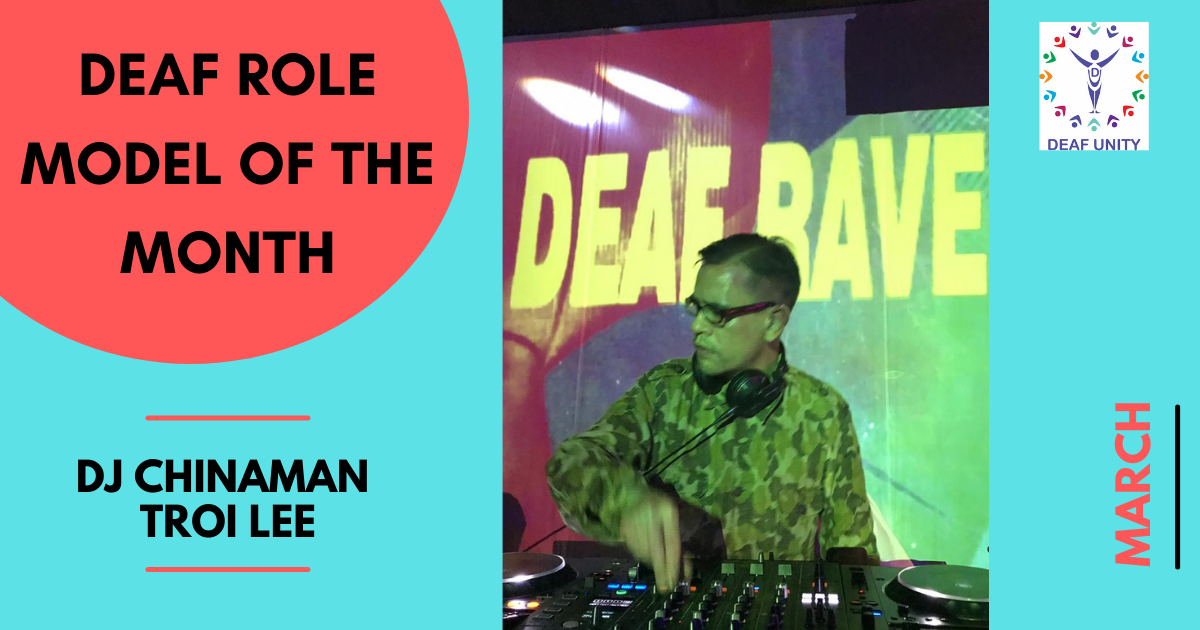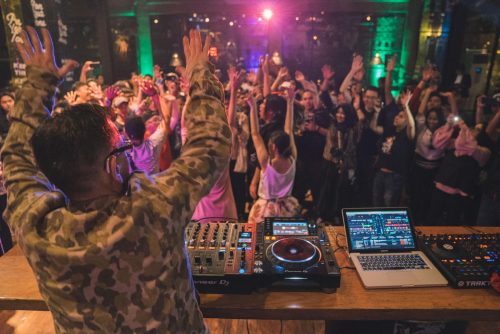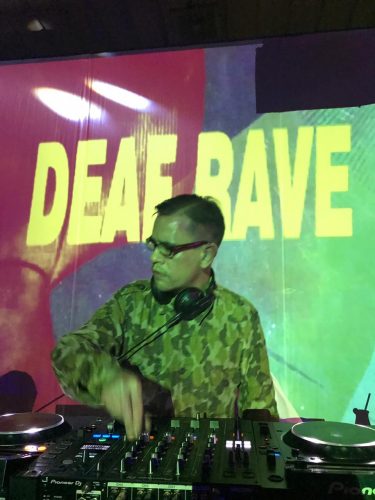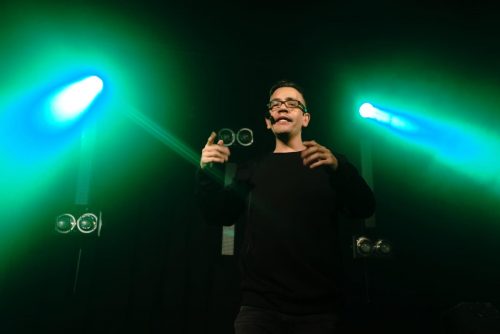
Each month we invite an inspirational or outstanding deaf role model to share their story. From what they’ve learnt, to what they wish they’d have known and their best deaf tips.
This month we welcome DJ Chinaman. Most people know of DJ Chinaman – or Troi Lee – as a leader in the field of Arts and Music within the Deaf Community. Read about his fascinating journey to embrace his deafness and push through any obstacles that faced him.
Interview in BSL:
Introduction
Hello to all out there my name is Troi Lee, aka DJ Chinaman. I’m the founder of Deaf Rave. We have been together from our founding in 2003 until now and I own the company. We specifically provide events and festivals and if someone wants to set up their own event, we specialise in consulting with them. Our work is linked to music, shows, visual performances and other things like DJ workshops and consultation. It is my passion and what I love to do. My biggest achievements I would say, have been enjoyable work I have done in TV, media, international speeches held abroad, Facebook advertising and also one of my proudest moments was when Boris Johnson awarded me a certificate for Culture linked to the work I have done over my past 17 years of service.

What is your Deaf Story?
I was born deaf. I have a twin brother and at the time we were born the umbilical chord was wrapped around my neck, cutting off the air to my body, that is how I became deaf. This did not happen to my brother – he is hearing. I kind of blame my brother jokingly, like he wrapped the chord around me.
My first language is oral, I am a strong lipreader. I also have hearing aids and am lucky that with them I can hear sounds clearly. What is my hearing story? I am proud to be Deaf. I feel I have a duty to inform the world – especially hearing people – and I aim to raise Deaf awareness. I can do this as I have a platform to speak from sometimes at different events, I am proud of my Deaf identity and proud of Deaf culture so that’s what I do.
When did you learn BSL?
What is my experience of BSL? Well really I started using sign language more from the age of 17, because I was going to a Deaf pub in London. At that time the Deaf community was very strong, many people would come together to sign, it was fantastic. There were so many varieties of communication that we could all adapt to, SSE, oral or BSL. So I’ve been using sign language since I was 17 years old, until now aged 46. But like I said before my first language is English and I can adapt myself to other ways of communicating. It is important to learn BSL as it is our community’s first language and if I plan an event I do what I can to make the event Deaf-friendly. We will provide interpreters if there are speeches and we do have performers, for example, who use sign language.
What was your experience in education?
My experience in education was mixed. When I was growing up I was in a mainstream school that also had a PHU – Partially Hearing Unit. At that time it was fantastic as there were lots of us who were Deaf students, mixed with the hearing students. Growing up then I was lucky because my hearing aids meant I could hear some sounds and voices.
My secondary school was a similar experience but worse. It was a terrible experience because at time there were only two Deaf students in my class of about 30 children. It was tough because everyone was talking so fast and the teacher had no Deaf Awareness. It was really difficult. That was Haverstock school in Camden Town. My mother then fought with the council to send me to a specialist Deaf school and finally I was sent to Ovingdean Hall school in Brighton. It really changed my life. I had to learn at double speed and work really hard to take in all of the school work, from the age of 14 to 17 years old. It really did change my life because now I have around 5 – 7 GCSE’s, I was lucky. My friend from the school in Camden Town, didn’t achieve any GCSE’s so I am lucky my family fought for me. It is important that education for all Deaf children has the right access and support because they have specialised needs. We need to envisage a future where Deaf children should have a fair education.
What barriers have you faced? How did you overcome them?
Really I have always had experiences of barriers through my life because I am Deaf. But I am stubborn. I will continuously fight to work around them and find a way through. I know I need to have confidence and self-belief. One example was when someone told me ‘Oh you can’t set up Deaf Rave, it’s impossible!’ I said, ‘Hold on, that’s not true. If you say that, it means you’re limiting yourself. Your vision is limited. My vision is huge’. I can visualise how to adapt and find ways, you always have ways through. You just need to know how you will work on your aim, so you can achieve it. Then carry on until you reach another barrier and you will find a way to overcome that barrier too. You just repeat the process of finding other ways. So never give up.
Where does ‘DJ Chinaman’ come from?
A long time ago when I was 17 and becoming involved in the Deaf world, I would go to Deaf events or Deaf pub nights and lots of Deaf people would ask me my name. At that time I didn’t have a sign name. Eventually someone gave me one, ‘Chinaman’. Back then I accepted it and liked the name because at the time there were very few Chinese people in the Deaf Community. It was very rare to see another Deaf Chinese person, so I liked the name. Now the Deaf world knows who I am: ‘DJ Chinaman’, that’s me and it connects me to Deaf Rave. I’ve been around for a long time. I’ve been in the media, TV interviews, radio interviews and newspaper interviews so I’m proud my name has carried on out there for all this time. It’s all thanks to Deaf Rave because without that it would be difficult to know who I am. I’m proud of my name.

How did Deaf Rave come about?
Deaf Rave started in 2003, back then there were not many parties for the Deaf Community and at Deaf pub nights there were always problems. Fights were breaking out in different pubs and landlords were wanting to ban Deaf people because of it. In the end I was fed up and had the thought, ‘why not create a safe environment for one night?’ Something that could continue for hours from 9pm to 6am the following morning. That was usual for back then, there were some fantastic parties! So 200 Deaf people from overseas would stream into London along with 500 Deaf people from the UK, altogether 700 people for my very first party. It was a huge success.
From that time to now Deaf Rave has grown and we are still around doing a variety of events. We do it because it is so important that the Deaf Community continues, remains connected and keeps its unity. It’s an important part of Deaf culture. If there are no Deaf events where can Deaf people go to interact with other Deaf people? We don’t want more isolation, it will just make things worse. It’s important that we have social events that many people can go to to chat, maybe have a drink or some food, dance or whatever they feel like doing. It’s important to keep the community bonded and together.
Who attends your events?
Who regularly attends Deaf Rave? Well, I have quite a few examples. There is the Deaf Rave team, the Deaf DJ’s who regularly attend Deaf Rave events. Because we provide music we need Deaf DJ’s to bring the thumping beats and give energy to the audience. There are also the fans who regularly come to our events. They are passionate about the Deaf community and love to meet other people and get to know new friends or catch up with old friends from before.
What are some of the best venues you have played?
The best venues we’ve had for our parties? There have been quite a few over the years. I would say one of my favourite most legendary parties, was in 2003 at the Glasshouse, it was off the hook. There were 3 rooms on three floors and over 1,100 Deaf people came from all over to party. It was next to the river Thames. Such a fantastic time. The Deaf Community was beautiful and BSL was being used everywhere, people were dancing, meeting new friends and hugging. Yeah, but that was the past and we can’t keep living in the past. We need to think about the future.
An event I would like to have in the future would be my own festival in a park, for Deaf children and adults. So people can come from all over the UK. It would have different activities, at night the adults could socialise and talk to each other and the morning and afternoon would be for children. It could have live performers like a clown or a mime and a children’s workshop for creating art. So my dream is to get back to that. 2019 was the first one and it was a big success in London’s Victoria Park. I hope we can go back there again after Coronavirus is gone.
What kind of music inspires you?
Music has helped me through difficult times. If I go right back to when I started to love music, I was 14 years old. My mother bought me a cassette player with headphones as a birthday present. It was amazing! The headphones had a switch for a loop system so I could hear the hip hop beats. I could not understand the lyrics but I could hear the sounds of the beats and it felt amazing. I was also lucky growing up that people in my family like my cousins and my brother were all involved in music. My twin brother was a drummer in a band and my two cousins were professional DJs. I would look at them and think ‘it looks great, I like that music and I really want to do the same’ and that’s how I became involved with music. I like all different types of music but I am more of a ‘sound and beats’ man. The lyrics and words go over my head but I’m still passionate about how music feels and how the body responds to it, depending on the rhythm and the beat it has.

What would you say to those who say music isn’t for Deaf people?
Some people say ‘Deaf people can’t enjoy music.’ I say it’s 50/50, some Deaf people like music and some Deaf people don’t. When Deaf Rave was originally set up it was really aimed at music more and at the same time providing a social gathering for everyone to mix and sign together. It was important to have both of these things and maybe a drink and to make sure everyone has a good time.
For the Deaf people who don’t like music we also have shows, visual performances such as signed songs and Deaf performers like MC Geezer or Sign Kid who make their own music and write their own lyrics in BSL. We aim to adjust ourselves to the Deaf view that you can enjoy music if you have the lyrics in sign language. We also have comedy and VV (Visual Vernacular) so it is not only music that Deaf people can come to our events to see. There are other performers people can watch and enjoy. That is how we are fair, it is my job to create opportunities for our Deaf performers to show their skills and we hope to inspire future Deaf generations. So they can watch and be inspired to do the same.
What makes you proud to be Deaf? Who inspires you?
I’m just a human being. I have role models that I look up to, like Dr Paddy Ladd who is a very special Deaf person for me to look up to. I see him as being ‘Mr Deaf Culture’. I am very proud of him and he is also very proud of me. For me personally I consider him a very special man.
I am proud of who I am as a person and I love my Deaf Community. I have an empathy for them and a passion to make sure we keep the community sweet and safe. We want to keep the good vibes and peace going, not criticism and negativity because it’s not the right way.
I’m sorry but I have to be straight, we need to be positive and support each other so the Deaf Community can grow, not shrink. I’m proud that I’m keeping the Deaf community together the best I can, although I’m not Mr Magic. We will carry on with Deaf Rave and our events to keep the community spirit alive, I’m proud of that.
How can someone be an effective ‘ally’ to the Deaf Community?
I think that overall this is important. One of the reasons we have had success with Deaf Rave is because of the interactions I’ve had with hearing organisations and charities who provide funding. At the end of the day it is one world. Yes we have a Deaf world and a hearing world but it is altogether one world. We need to network to make connections and cooperate with contacts. The good thing is that some hearing people are ‘cool’ while others can be awful. We need to find the right hearing people to support us in a positive way, the good people. We shouldn’t say ‘I want nothing to do with hearing people’. If hearing people want to learn sign language we should support that but it is important that those people show empathy and respect to Deaf Culture. It is important that they have empathy for our community, if they don’t have that and they look down on us it does not match our needs. They can’t give us a flowing interaction to move forward with. You need to trust your own judgement of this.
Really at the end of the day we need interaction with hearing people so they can support or fix a problem we might have. We need to keep the links so life is sweet. Never burn bridges, keep these connections so if you need someone’s support you can ask them again.
What are your Top Tips for Deaf people?
- Always make new contacts, you have to network. It’s important as you could find someone who has a lot of knowledge about something when you only have a little. You can make contacts via an interpreter or by sending a message or email. You never know when you might develop a good relationship or partnership with someone.
- Always be learning. It doesn’t matter if you’ve left school and think you have qualifications from school and are finished. The world is changing all the time. For example, recently with Coronavirus coming to this country in March 2020, we have needed to learn how to adapt, how to cope and find a way through. So when I say learning and taking in new information, there are many different subjects that could be useful for your skills and your knowledge. It’s important that you always keep learning as there is always something new to learn. Millions of things.
- When communicating with hearing people, try to find the best way to have a conversation. If it is difficult, see if you can adapt to make it better, don’t give up. There is always a way like I said before in this interview. You will always find a way so never give up. Maybe you can teach them some more Deaf awareness. Yes, it is tiring but we have a responsibility to sort it out.
I hope you have all enjoyed this interview. I hope I have inspired you all by watching what I have been through in life and you can see I am the type of person who never gives up. I do feel that we Deaf have suffered through the years but there is suffering in other Deaf communities throughout the world and here, we are better off. We have a fairly good system compared to other countries that are poor and have no system or support. Here we are lucky, so use that and don’t take things for granted. Use it and have positivity and confidence. Thank you.
Looking for more support? We’ve made it our mission to improve the lives of deaf people everywhere. Check out Deaf Unity’s projects to find out what we can do for you. If you’d like to get in touch, contact us here.

